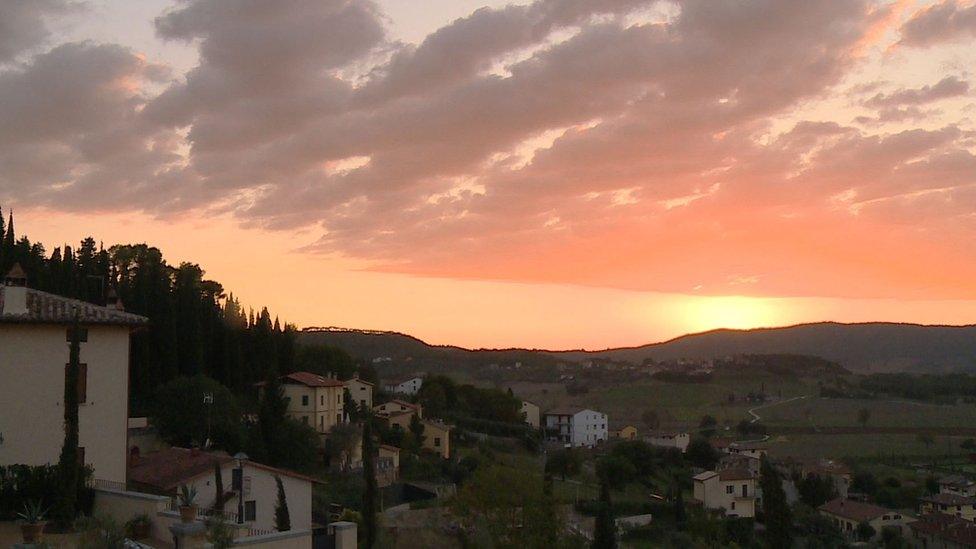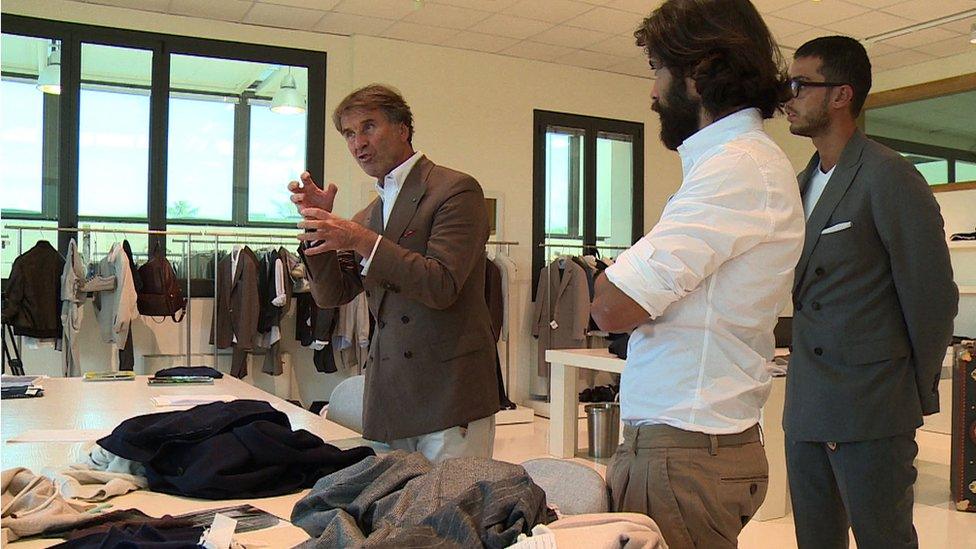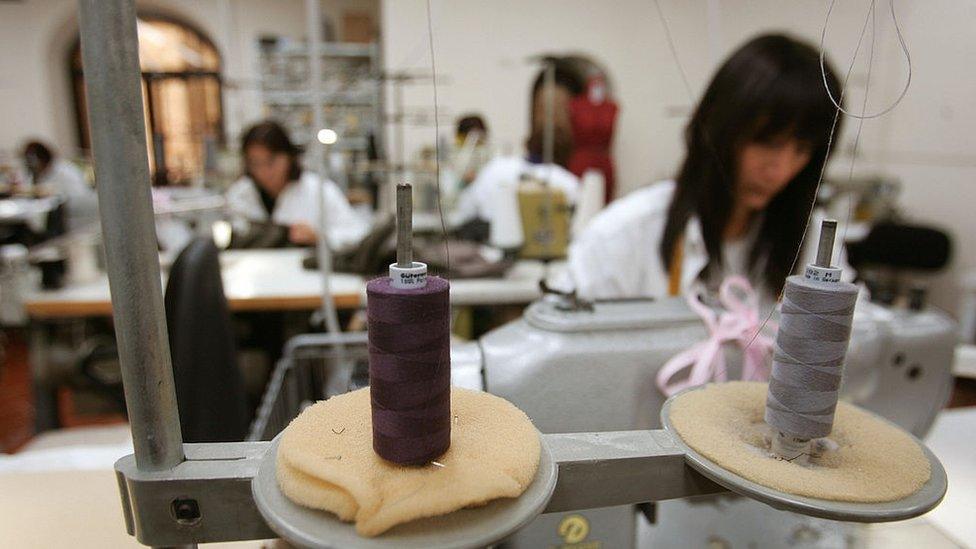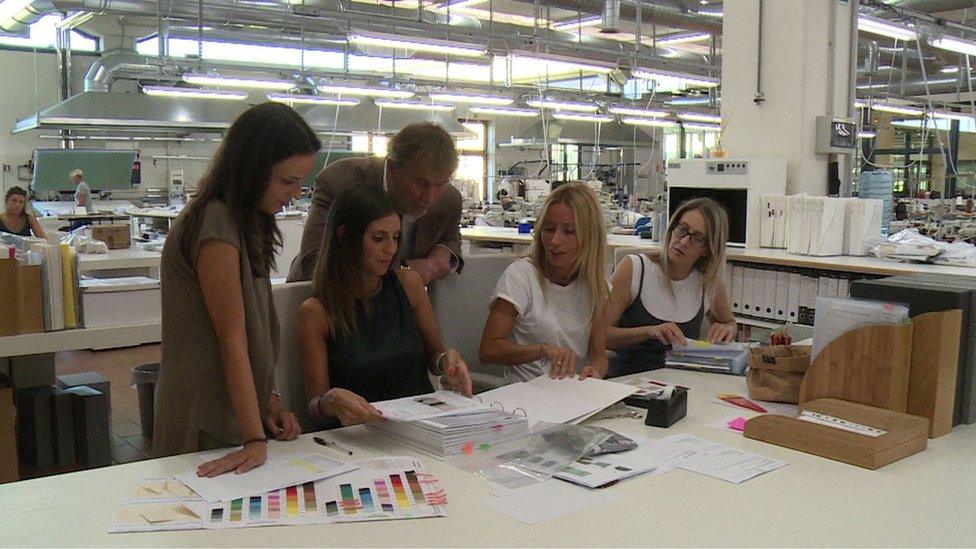Can ethics help your luxury business live forever?
- Published
Brunello Cucinelli's ambition is for his company to "survive for the next two or three centuries"
"Fashion", according to Coco Chanel, "is ephemeral, but style is eternal". But what about the enterprises that design and make it?
The Italian designer and cashmere garment maker Brunello Cucinelli may earn his living from what is one of the world's most fast-moving industries, but in contrast to some who are involved in it, he takes a very long term view.
He dreams of building a company that will "survive for the next two or three centuries."
The enterprise he has created is certainly substantial. Based in the hilltop village of Solomeo near Perugia in central Italy, it has stores all over the world and is listed on the Milan stock exchange.
It produces luxurious cashmere clothes that can cost thousands and are often worn by celebrities.
But how realistic are Brunello Cucinelli's ambitions, and what are his chances of building a fashion business that will thrive for hundreds of years?
Ever since he was a child, Mr Cucinelli wanted to make a mark. He grew up in the countryside in Umbria, not that far from where his company is now based.
His parents were farmers, and were far from wealthy.
"We had no electricity," he recalls. "I still have these memories of sitting at home with the candlelight, and getting up when the sun came up and going to sleep at sunset."

Brunello Cucinelli says his childhood in the Italian countryside was "happy"
Nevertheless, Mr Cucinelli remembers his childhood as a happy time - at least until the family moved to the city when he was a teenager. Then, things changed.
Like many poor farmers, his father dreamt of getting a higher-paying job in a factory - but the dream soon turned into a nightmare.
Buried trousers
At work, Mr Cucinelli says, "my father … was humiliated. He would often say, 'what in God's name have I done to deserve this?' And he had tears in his eyes - and those eyes were the source of my inspiration."
Although at the time he did not quite know what it was that he would do, Mr Cucinelli made a vow to "work for the moral and economic dignity of the human being".
He spent much of his youth, in the 1960s and 70s, discussing philosophy in a local cafe.
"People would debate about anything, about culture, politics…. in this kind of Italian cafe there is always somebody that is willing to listen to your ideas, your joys, your sorrows, your ideas, your soul," he remembers.

Dyeing cashmere garments, which were then usually sold in neutral shades, was initially met with outrage
Gradually, an interest in designing and making clothes emerged.
Mr Cucinelli says he has long had strong views on design and colour. As a child he refused to wear anything green. Once, when his mother gave him a pair of green trousers, he pretended that he had lost them - but had actually buried them in the garden.
No long hours
In the late 1970s, an unconventional idea came to him. At the time, according to Mr Cucinelli, cashmere garments were usually sold in natural or neutral shades - but he wanted to experiment.
He took some cashmere sweaters to a dyeing expert and asked him to dye them bright colours.
He was initially met with outrage: "he said to me, 'you can't dye these [sweaters] those colours, you'll ruin them!'", recalls Mr Cucinelli. But, he says, he managed to talk the expert round - and the results were "beautiful".
They proved to be a hit, so when the first order for 53 sweaters came in "I felt like Alexander the Great, I was so proud" he recalls.
From this small starting point, the business has grown steadily, and now employs thousands of people.

Workers at Brunello Cucinelli's firm are forbidden from working long hours
Mr Cucinelli says he has tried hard to build an enterprise that will last, and be in line with his youthful ideals. He believes that, if the company takes care of its workers, and the local community, it will not only make better products, but will also help to ensure its longevity.
He claims that workers are paid more than the industry average, and are forbidden from working long hours. "They need to have time for themselves" he explains, "this is part and parcel of the economic and moral dignity of work" he explains.
The company has also backed various charitable endeavours, including a tailoring school and a theatre.
'Chip in a casino'
But after the company listed on the Milan stock exchange in 2011, it now has external shareholders to consider. How, in the longer term, will outsiders with a stake in the business react?
"His approach is admirable," says Peter York, an author and consultant who has been an adviser to many large luxury businesses. He agrees that many companies have been pushed out of shape by short term considerations.
But Mr York warns that the long view is more common in privately held businesses, and that markets and investors can be fickle: "once you're a public company, you're a chip in a casino".
Brunello Cucinelli dismisses such concerns. He believes that other companies, particularly in the luxury field, are going to have to follow a similar, more long-term path to the one his business is trying to tread, if they want to succeed.

The company listed on the Milan stock exchange in 2011
He believes that technology will help to enable a new age, where modern communications will lead to greater transparency and "a great rebirth."
"The world is changing fast" he says. "There's a sort of 'ethicalisation' of mankind…not because we're better than we were a hundred years ago, but because we now live in a world where everyone knows everything about each other.
"So in order to be credible, you must be true. So it is a new world, and it will be a new, special century".